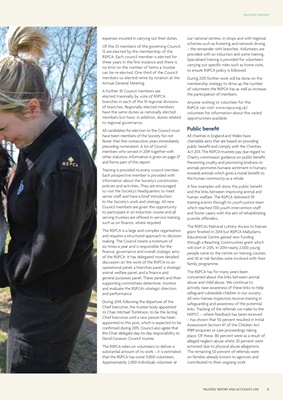
TRUSTEES' REPORT AND ACCOUNTS 2014 15
TRUSTEES' REPORT
expenses incurred in carrying out their duties.
Of the 25 members of the governing Council,
15 are elected by the membership of the
RSPCA. Each council member is elected for
three years in the first instance and there is
no limit on the number of terms a trustee
can be re-elected. One third of the Council
members so elected retire by rotation at the
Annual General Meeting.
A further 10 Council members are
elected triennially by vote of RSPCA
branches in each of the 10 regional divisions
of branches. Regionally-elected members
have the same duties as nationally elected
members but have, in addition, duties related
to regional governance.
All candidates for election to the Council must
have been members of the Society for not
fewer than five consecutive years immediately
preceding nomination. A list of Council
members who served in 2014 together with
other statutory information is given on page 37
and forms part of this report.
Training is provided to every council member.
Each prospective member is provided with
information about the Society's constitution,
policies and activities. They are encouraged
to visit the Society's headquarters to meet
senior staff and have a brief introduction
to the Society's work and strategy. All new
Council members are given the opportunity
to participate in an induction course and all
serving trustees are offered in-service training,
such as on finance, where required.
The RSPCA is a large and complex organisation
and requires a structured approach to decision
making. The Council meets a minimum of
six times a year and is responsible for the
finance, governance and overall strategic aims
of the RSPCA. It has delegated more detailed
discussion on the work of the RSPCA to an
operational panel, a branches panel, a strategic
animal welfare panel, and a finance and
general purposes panel. These panels and their
supporting committees determine, monitor
and evaluate the RSPCA's strategic direction
and performance.
During 2014, following the departure of the
Chief Executive, the trustee body appointed
its Chair, Michael Tomlinson, to be the Acting
Chief Executive until a new person has been
appointed to this post, which is expected to be
confirmed during 2015. Council also agree that
the Chair delegate day-to-day responsibility to
David Canavan, Council trustee.
The RSPCA relies on volunteers to deliver a
substantial amount of its work - it is estimated
that the RSPCA has some 11,000 volunteers.
Approximately 2,000 individuals volunteer at
our national centres, in shops and with regional
schemes such as fostering and network driving
- the remainder with branches. Volunteers are
provided with an induction and some training.
Specialised training is provided for volunteers
carrying out specific roles such as home visits,
to ensure RSPCA policy is followed.
During 2015 further work will be done on the
membership strategy to drive up the number
of volunteers the RSPCA has as well as increase
the participation of members.
Anyone wishing to volunteer for the
RSPCA can visit: www.rspca.org.uk/
volunteer for information about the varied
opportunities available.
Public benefit
All charities in England and Wales have
charitable aims that are based on providing
public benefit and comply with the Charities
Act 2011. The RSPCA trustees pay due regard to
Charity commission guidance on public benefit.
Preventing cruelty and promoting kindness to
animals promotes humane sentiment in humans
towards animals which gives a moral benefit to
the human community as a whole.
A few examples will show this public benefit
and the links between improving animal and
human welfare. The RSPCA delivered 59
training events through its youth justice team
which reached 700 youth intervention staff
and foster carers with the aim of rehabilitating
juvenile offenders.
The RSPCA's National Lottery Access to Nature
grant finished in 2014 but RSPCA Mallydams
Educational Centre gained new funding
through a Reaching Communities grant which
will start in 2015. In 2014 nearly 2,000 young
people came to the centre on training courses
and 50 at risk families were involved with their
family programme.
The RSPCA has for many years been
concerned about the links between animal
abuse and child abuse. We continue to
actively raise awareness of these links to help
safeguard vulnerable children in our society.
All new trainee inspectors receive training in
safeguarding and awareness of the potential
links. Tracking of the referrals we make to the
NSPCC - where feedback has been received
- has shown that 50 percent resulted in Initial
Assessment Section 47 of the Children Act
1989 enquiries or care proceedings taking
place. Of these, 80 percent were as a result of
alleged neglect abuse whilst 20 percent were
actioned due to physical abuse allegations.
The remaining 50 percent of referrals were
on families already known to agencies and
contributed to their ongoing work.